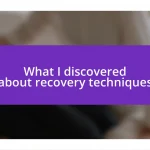Key takeaways:
- Setbacks are opportunities for growth, teaching self-awareness and resilience through the recovery process.
- Creating a structured recovery plan with clear goals, rest, and support enhances healing and maintains motivation.
- Embracing a growth mindset and vulnerability fosters emotional resilience and deeper connections with others.
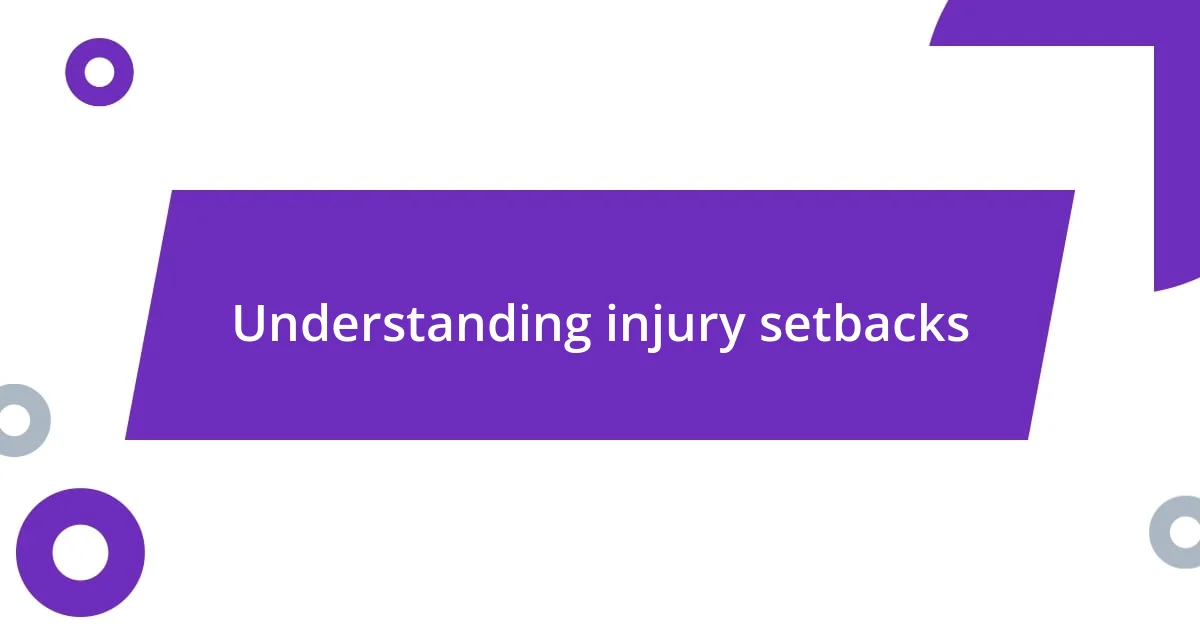
Understanding injury setbacks
Injury setbacks can feel like a betrayal when your body doesn’t cooperate with your ambitions. I remember twisting my ankle during a crucial game, and in that moment, all I could think about was how it would derail my plans. Have you ever felt that tight knot of disappointment in your stomach when you realize your progress has been halted?
As I navigated my recovery, I began to understand that setbacks are a part of growth, both physically and mentally. The emotions ranged from frustration to acceptance, and it dawned on me that taking the time to heal was just as important as pushing through the pain. Isn’t it interesting how our setbacks often reveal our resilience when we face them head-on?
Every injury comes with a lesson if you’re willing to look for it. For instance, I learned that listening to my body is crucial. I found myself reflecting on how my previous relentless drive sometimes ignored warning signs. Have you ever considered what your body might be trying to tell you during a setback? Embracing these moments can lead to deeper self-awareness and ultimately strengthen your journey forward.
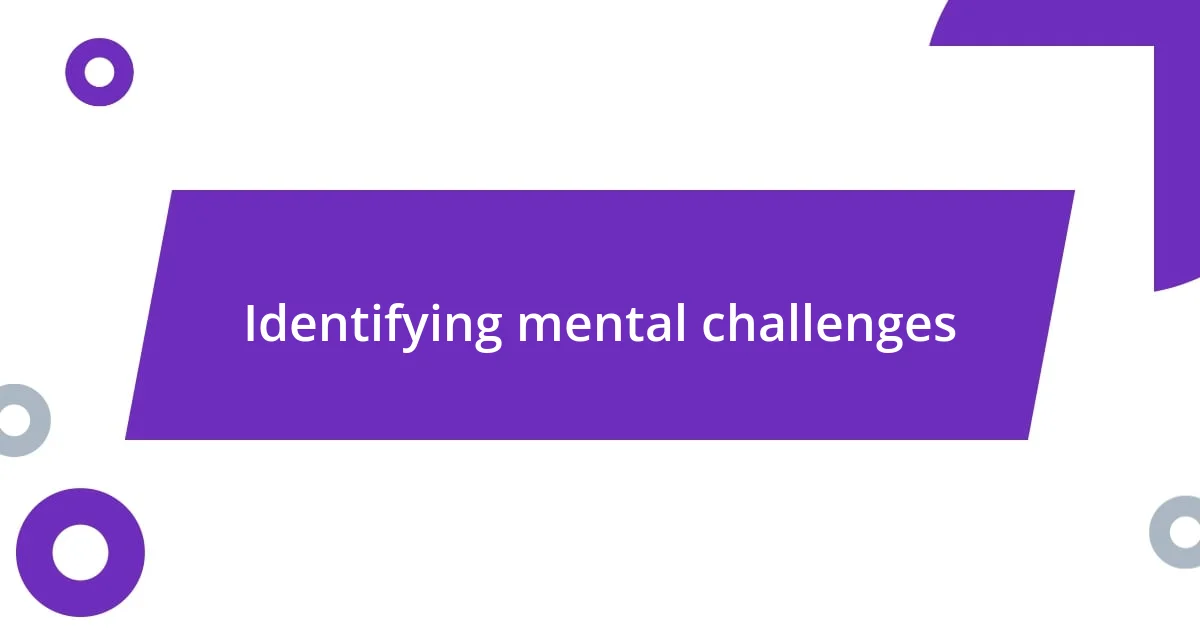
Identifying mental challenges
Identifying mental challenges during injury setbacks is crucial for navigating the emotional landscape that comes with them. I remember sitting on the sidelines, plagued by self-doubt and anxiety, questioning if I’d ever return to my previous form. Have you ever found yourself caught in that whirlwind of negative thoughts when things don’t go as planned?
Sometimes I felt a sense of isolation, as if no one else truly understood what I was grappling with internally. It’s fascinating how injury can amplify feelings like frustration and hopelessness. When I reevaluated my mindset, I began to recognize these emotions as my body’s way of signaling the need for compassion rather than criticism. How can we learn to embrace these struggles instead of shying away from them?
There were days when I simply couldn’t shake the feeling that I was letting everyone down, from my teammates to myself. During one particularly tough week, I took a moment to journal about my feelings, which allowed me to confront my mental barriers. Writing became a therapeutic outlet that helped me see the light at the end of the tunnel. Have you tried turning to creative outlets in moments of despair? By identifying these mental challenges, we can transform our setbacks into stepping stones for emotional healing.
| Challenge | Emotion |
|---|---|
| Self-doubt | Anxiety |
| Isolation | Frustration |
| Letting others down | Despair |
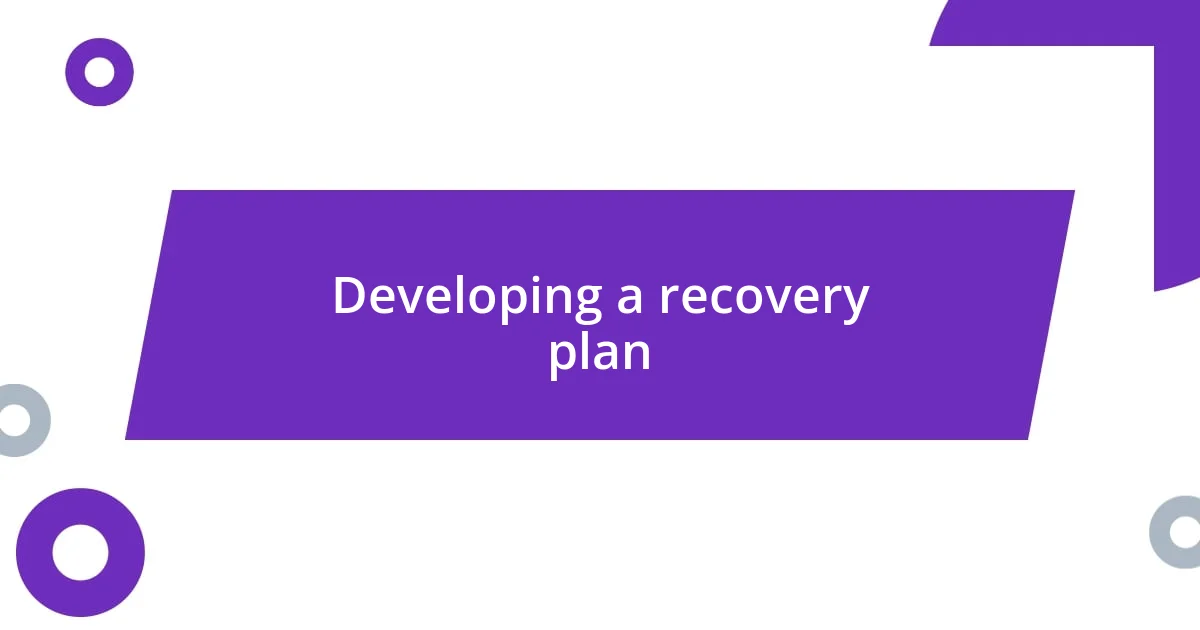
Developing a recovery plan
Creating an effective recovery plan is an essential step in turning setbacks into comebacks. Once I realized that recovery wasn’t just about physical healing, I started mapping out a detailed approach. Initially, I broke my plan into manageable segments, balancing rest with gradual activity. This structure helped keep me focused during those frustrating days when progress felt agonizingly slow.
Here’s a quick breakdown of what my recovery plan included:
- Set Clear Goals: I established realistic, short-term goals that motivated me daily without overwhelming me.
- Prioritize Rest: Listening to my body became paramount; I scheduled rest days to promote healing.
- Incorporate Rehab Exercises: I included gentle rehabilitation exercises to gradually regain strength and flexibility.
- Track Progress: Keeping a journal not only helped me visualize my journey but also kept my spirits up by highlighting small victories.
- Stay Connected: I reached out to teammates and friends for support, realizing the power of shared experiences in the recovery process.
By crafting a thoughtful recovery plan, I found a sense of control amidst the uncertainty of injury. Each small step reinforced a positive mindset, reminding me that patience is as vital as persistence.
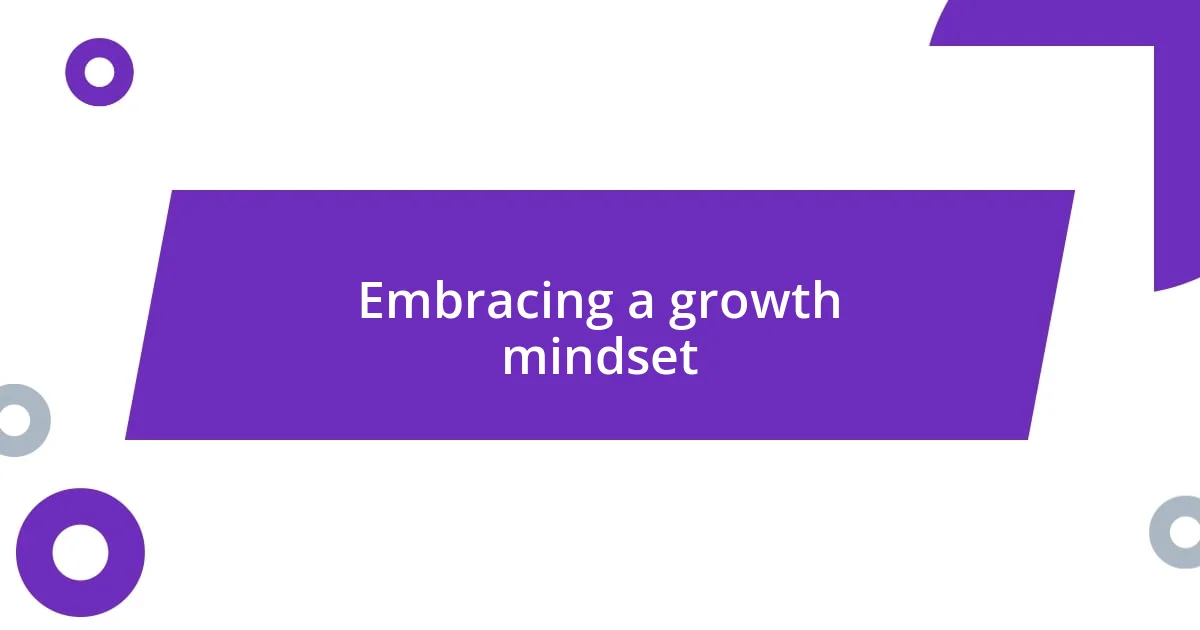
Embracing a growth mindset
Embracing a growth mindset during recovery has been a game changer for me. I often remind myself that setbacks are not failures but rather opportunities to learn. For instance, when I faced a significant injury, I chose to view it as a chance to focus on mental resilience. Have you ever thought about how challenges can shape your perspective?
It was a tough realization, but I began to appreciate the value of patience and adaptability. I vividly recall a day when I struggled to even perform the simplest rehabilitation exercises. Instead of allowing frustration to take over, I shifted my focus to what I could do, however small it seemed. This shift in mindset not only uplifted my spirits but also paved the way for gradual progress. Have you ever noticed how small wins can accumulate and build your confidence?
As I embraced this growth mindset, I found myself celebrating the little victories, like the first time I could complete a set of stretches without pain. It was these moments that reignited my passion and motivation. I started to ask myself, “What can I learn from this?” Rather than feeling defeated, I felt empowered to take control of my healing journey. Isn’t it amazing how changing your perspective can make a world of difference in your recovery?
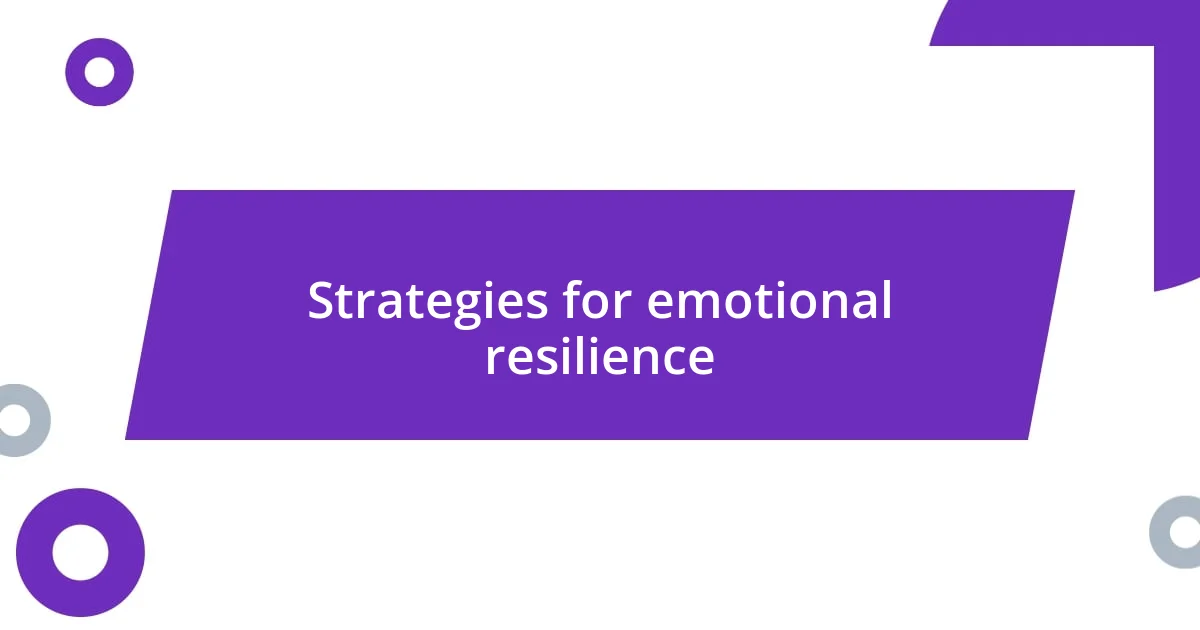
Strategies for emotional resilience
Building emotional resilience during the recovery process taught me the importance of self-compassion. I often found myself frustrated, yearning for the days when I could do everything effortlessly. Instead of chastising myself for my limitations, I started practicing gentle self-talk. “It’s okay to struggle,” I would remind myself, allowing those moments of vulnerability to transform into opportunities for growth. Have you ever considered how kindness towards ourselves can shift our emotional landscape?
A key strategy I discovered was the power of mindfulness and grounding techniques. When anxiety crept in, I would take a few moments to focus on my breath, grounding myself in the present. Sometimes, I’d close my eyes and visualize positive outcomes or recall memories of triumph. This simple practice helped me regain control over my racing thoughts. It’s interesting how just a few minutes can shift our entire perspective, isn’t it?
Moreover, surrounding myself with supportive people played a crucial role in my emotional recovery. I learned to lean on friends who understood what I was going through. Whether it was sharing a meal or just chatting about everyday life, these connections reminded me that I wasn’t alone on this journey. It’s incredible how a simple conversation can provide comfort and clarity during tough times, don’t you think?
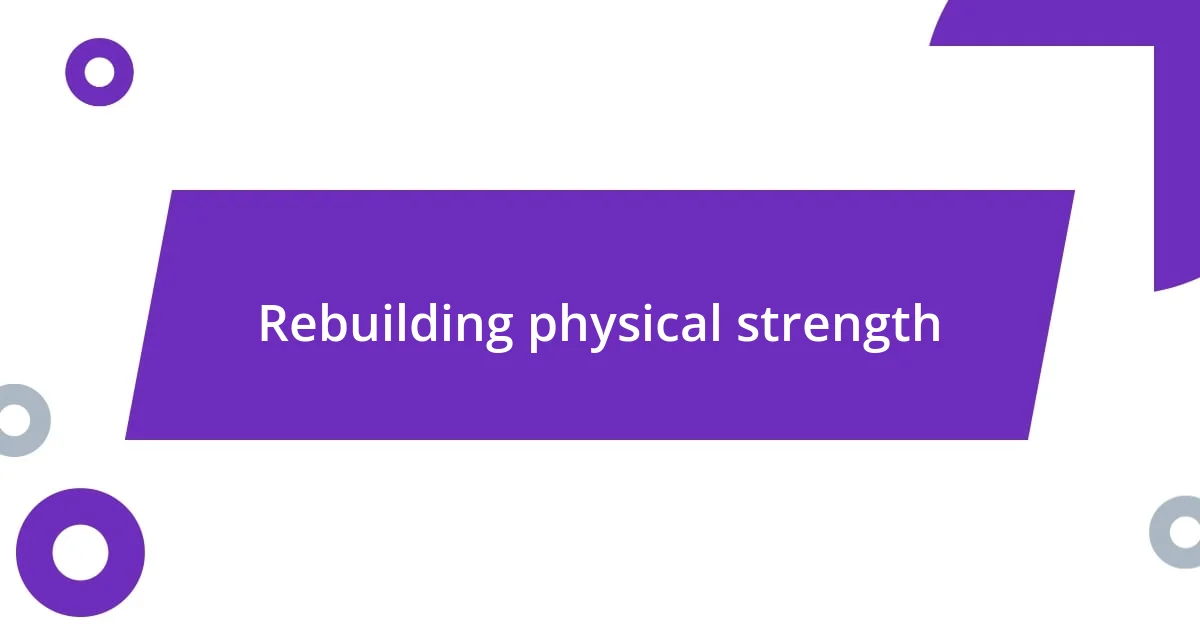
Rebuilding physical strength
Rebuilding physical strength after an injury felt like climbing a mountain. I remember the first time I attempted to lift even the lightest weights; my body protested, and I could feel every muscle aching. Yet, I learned that each trip to the gym, regardless of how small the effort, was a step forward. Have you ever found it challenging to see progress when the journey feels insurmountable?
As I navigated this path, setting achievable milestones became my secret weapon. I vividly recall setting a goal to walk a little further each day. At first, even a few minutes felt daunting, but soon, those minutes turned into miles. Seeing my endurance grow day by day slipped me into a rhythm I hadn’t noticed before. Isn’t it fascinating how our bodies can adapt when we give them the chance?
I also discovered that incorporating variety into my routine kept my spirits high. Trying new exercises kept things fresh and reminded me that rebuilding strength was not just a chore, but an adventure. I remember the thrill of finally mastering a challenging yoga pose, which made me realize that recovery can be just as rewarding as the peak strength I was striving for. Isn’t it amazing how embracing new challenges can transform the recovery process?
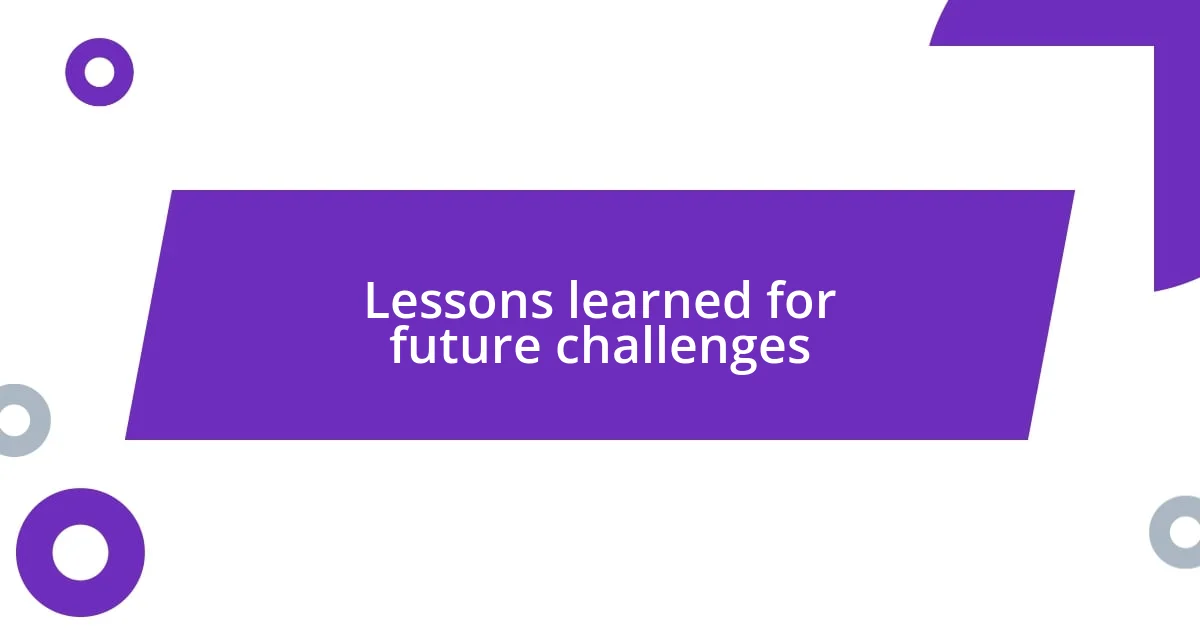
Lessons learned for future challenges
As I reflected on my experiences with injury setbacks, one lesson stood out: flexibility in my approach is essential. I remember determining a workout plan that seemed perfect, only to realize halfway through that it was unrealistic given my recovery. Adapting my expectations and accepting that some days would require a lighter load taught me that resilience isn’t just about pushing harder; sometimes, it’s about knowing when to pivot. Isn’t it liberating to understand that taking a step back can actually propel us forward?
Another key insight was the importance of patience in my journey. Early on, I often found myself frustrated by how slowly progress unfolded. I recall times when I would compare myself to others and feel disheartened. But then I began to appreciate the small victories—the days I felt stronger or more confident, even if I wasn’t yet lifting heavy weights. This understanding has reshaped my perception of success; it reminded me that every little achievement has a place in my story. Have you ever noticed how the journey itself can be just as valuable as the destination?
Lastly, I learned that embracing vulnerability is a strength. I used to shy away from expressing my fears or insecurities, thinking it would show weakness. However, I found that sharing these feelings with others often led to deeper connections and support. Being open about my struggles not only lightened my emotional burden but also inspired those around me to share their experiences. It’s remarkable how vulnerability can build a bridge of understanding and camaraderie, don’t you agree?










